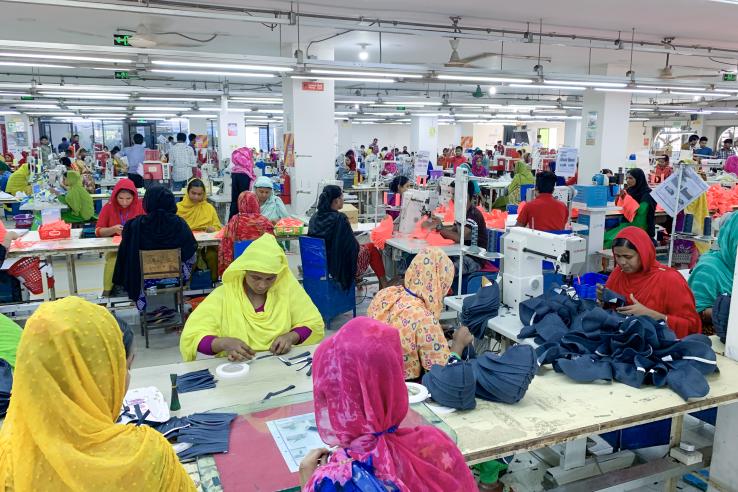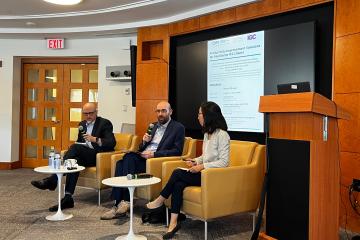
J-PAL expands efforts to promote corporate sustainability and social impact partnerships

After 20 years of evidence generation and synthesis delivered in partnership with cross-sector stakeholders, in the next decade, J-PAL is accelerating our work to bring evidence-based strategies to drive corporate sustainability and social impact.
The private sector is a significant global employer, producer, and emitter, as well as a source of vast resources and knowledge. Nearly 90 percent of jobs created in developing countries are in the private sector. Global investment in sustainable investing assets ($30 T) outstrips net official development assistance ($202 B) by 150 times. The scale and consequence of this reach, together with the speed and flexibility of corporate action, make corporate actors a key partner in addressing the greatest environmental and social challenges of our time. It is therefore critical that its efforts and resources bear the maximum possible impact.
J-PAL’s network of researchers from over 270 universities worldwide has conducted rigorous randomized evaluations to produce keen insights into tried and tested interventions in the fight against poverty. These 2,200+ evaluations have been undertaken in partnership with governments, non-profits, private companies, multilaterals, and foundations.
But J-PAL does not stop at just measuring the impact of programs. We create policy insights that outline our policy-relevant recommendations from multiple studies, partner with organizations to scale programs found to be effective, and build the capacity of our partner organizations to increase their use of evidence in decision making.
J-PAL has already worked with many corporate sector partners, including banks, multinational companies, and domestic firms. As we mark our twentieth anniversary, one of our strategic priorities for the next decade is to greatly increase our engagement with the corporate sector for impact and sustainability, in partnership with Community Jameel.
The rise of sustainable business
In recent years, there has been an enormous increase in the number of companies and investors publicly committing to creating positive social and environmental impact. These efforts, driven by a combination of moral imperative; changing consumer, employee, and investor preferences; and regulations; present both opportunities and risks to businesses. In this changing business environment, companies may face uncertainty as to which approaches are most effective, which are counter-productive, and which might appear positive but may leave businesses open to questions regarding their reported impacts. Common sustainable business challenges include managing the energy transition, ensuring worker well-being and engagement, and increasing the resilience of supply chains.
Grounding decisions in rigorous scientific evidence is essential to overcoming these challenges and helping companies make decisions on which approaches they should invest in. Meeting ambitious corporate sustainability goals will also require innovation and a willingness to take risks. At J-PAL, we are already engaging with companies, often impact leaders in their industries, to test new and innovative social and environmental efforts, in a way that generates meaningful and credible evidence of impact.
Rigorous evidence and corporate sustainability
Our emerging corporate partnerships are taking a number of exciting forms. J-PAL’s extensive database of evidence, including insights from completed randomized evaluations in finance, climate change, education, health, and other sectors, can provide useful guidance to companies seeking to deliver social and business impact. We can work with our partners to map this evidence to their priorities and context so that companies can invest in programs with proven impact. (Read more about J-PAL’s generalizability framework.) When existing evidence does not neatly help answer questions that companies face, J-PAL can also “matchmake” companies with world-leading researchers to collaboratively design, pilot, evaluate, and scale new and innovative ideas.
For example, last year J-PAL launched UJALA, an agricultural research lab with OCP Africa, a subsidiary of OCP Group and a leading global provider of phosphate, as a key partner to increase small-scale farmers’ food security, productivity, and profitability. A collaboration between University Mohammed VI Polytechnic and J-PAL, and funded by the OCP Foundation, this partnership will share findings from hundreds of randomized evaluations conducted by researchers in the J-PAL network on how to improve agricultural outcomes.
Randomized evaluations can also help companies establish links between sustainability and the resulting business impacts of these programs, such as productivity increases and reduced costs. For example, researchers partnered with Shahi Exports in India to conduct a randomized evaluation of a leading garment industry skilling program. The results showed that soft skills training for female workers dramatically improved productivity and returns to the firm, but also that alternative designs would be necessary to ensure that workers share these benefits.
Evaluations can also help private sector companies determine the most effective approaches to reducing their climate impacts. For example, J-PAL affiliates have collaborated with Virgin Atlantic to evaluate the effectiveness of management practices in encouraging commercial airline captains to implement more fuel-efficient behaviors, delivering both significant emissions reductions and cost savings.
The road ahead
In the past few months we have embarked on a listening tour, engaging with dozens of stakeholders in the corporate sector to understand their priorities for sustainable business. We look forward to building on this foundation and taking action this year and beyond.
First, we will share best practices companies can use to leverage existing rigorous evidence to achieve sustainability goals. Second, we will work with companies seeking to incorporate evidence into the design of inclusive products and services to maximize the impact of their investments. Finally, we plan to help foster powerful coalitions between corporate actors, researchers, and governments to use evidence to accelerate impact at scale.
We are seeking purpose-driven corporate partners committed to sustainable impact. Please reach out to [email protected] to get in touch with our team or join our mailing list.
Learn more about J-PAL's Corporate Impact and Sustainability Partnerships.
Related Content

J-PAL and UM6P launch new agriculture research lab to improve food security and support evidence-informed decision-making in sub-Saharan Africa

J-PAL partners with the IFC and IGC to discuss global supply chains, sustainability, and research collaboration



